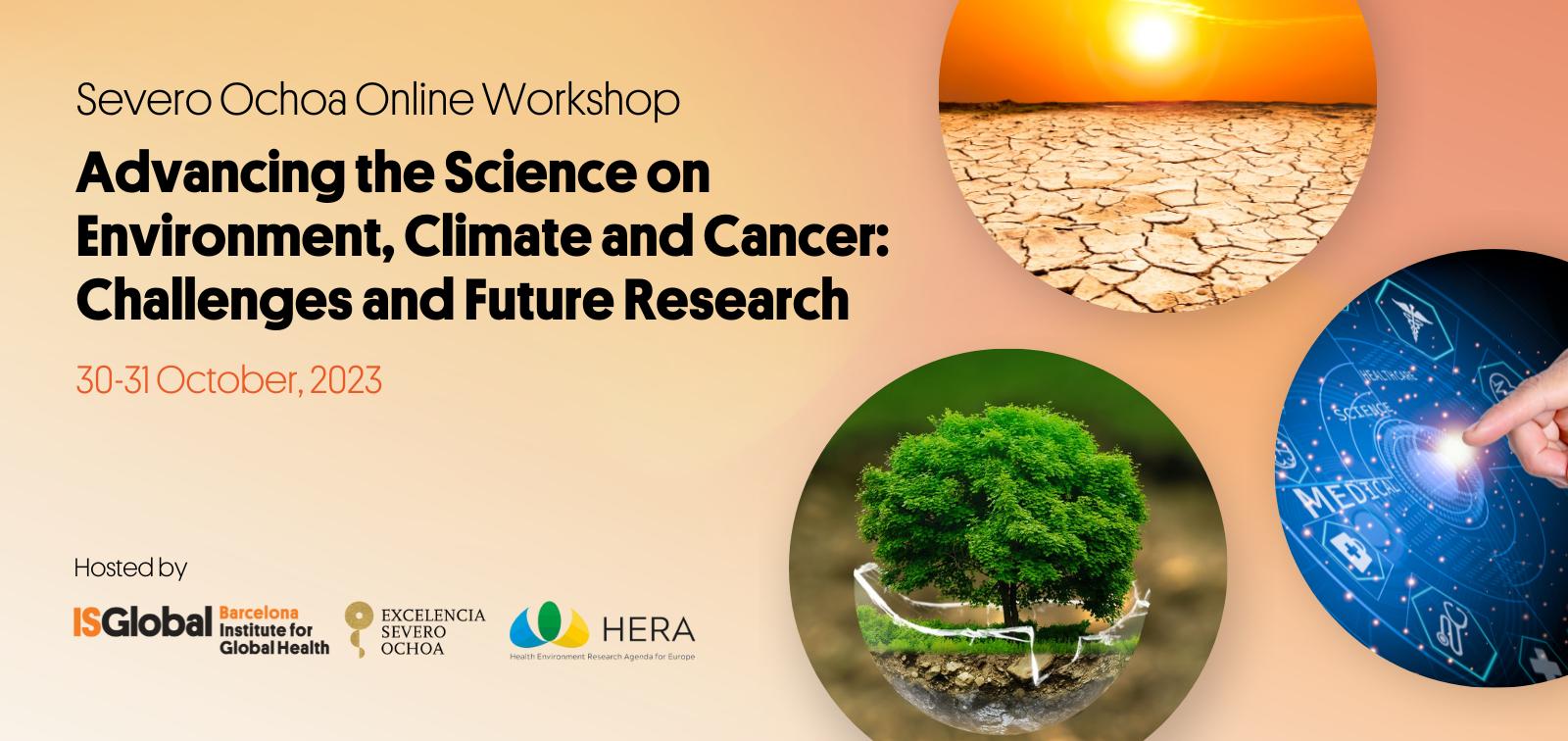Advancing the Science on Environment, Climate and Cancer: Challenges and Future Research
Severo Ochoa Online Workshop
30.10.2023
- Data
- 30/10/2023 - 31/10/2023
- Hora
- 14.00 - 19.00 h CET (9.00 - 14.00 h EDT)
- Lloc
- Online
While extensive research exists on the environment and cancer, a comprehensive summary of evidence, successes, bottlenecks, and future directions is lacking. Our online workshop aims to fill this void, addressing rapidly evolving research methods and giving an in-depth exploration of the intricate interconnections between the environment, climate, and cancer.
Join us as we delve into the latest research on non-occupational environmental factors and their potential impact on cancer development. Discover the complex relationship between climate change and cancer risk, an area that demands further investigation.
The event is free of charge, but registration is required. The workshop will include invited talks by international experts (see Programme), ample time for discussion and synthesis, and is also linked to a special Satellite Session on research by early career scientists on 27 October, co-organised by by ISEE's CAPE committee.
Explore the Impact of Environmental Exposures on Cancer Development
Scientific investigations have uncovered compelling evidence linking various environmental factors to an increased risk of cancer. From outdoor and indoor air pollution to substances like tobacco smoke, asbestos, benzene, UV radiation, ionizing radiation, chemicals, pesticides, and water contaminants—our experts will shed light on these critical connections.
We will also delve into the significant role played by individual susceptibility and the complex interplay between genetic and environmental factors in determining cancer risk. Gain valuable insights into how these factors interact and influence the development of cancer.
Evaluating the Complex Relationship between Climate Change and Cancer Risk
While climate change has become a global concern, its impact on cancer risk remains inadequately evaluated. Our workshop aims to fill the gaps in current knowledge. Join us and explore the intricate relationship between climate change and cancer as we discuss the exacerbation of air pollution, extreme temperatures, changing patterns of infectious diseases, altered food production and diet, shifts in the distribution and transport of chemical pollutants, and the impact of extreme events on healthcare provision.
Uncover New Insights and Future Research Directions
Our event aims to comprehensively evaluate the primary areas of research concerning environmental factors, climate, and cancer. Participate in stimulating discussions, gain valuable insights, and identify future research directions.
Join the Leading Experts in Cancer Research
Engage with renowned experts in the field of cancer research, benefiting from their knowledge and expertise as they share their latest findings and perspectives. Expand your professional network and contribute to advancements in this crucial area of study. This collaborative environment encourages interdisciplinary collaborations and networking opportunities among participants.
Be prepared for an enriching experience, featuring invigorating talks by international experts, ample time for discussion and synthesis, and a special session on research by early career scientists, co-organized by ISEE's CAPE committee. As a culmination of this event, we will produce a comprehensive report summarizing key findings and recommendations.
Panelists
Information on the participating panelists is available here.
Register now!
Don't miss the opportunity to register for this impactful event, where we will explore the intricate connections between environmental exposures, climate change, and cancer risk. View the full programme.
Together, we will uncover new perspectives and pave the way for advancements in this crucial area of study.
Workshop Organizers
- Manolis Kogevinas, ISGlobal, Barcelona, Spain
- Nicole Deziel, Yale University School of Public Health, Connecticut, United States
- Rena Jones, National Cancer Institute, Maryland, United States
- Robert Barouki, Universite Paris Cité, Inserm, Paris, France
- Mary Schubauer-Berigan, International Agency for Research on Cancer, Lyon, France
This workshop is supported by grant CEX2018-000806-S funded by MCIN/AEI/ 10.13039/501100011033




